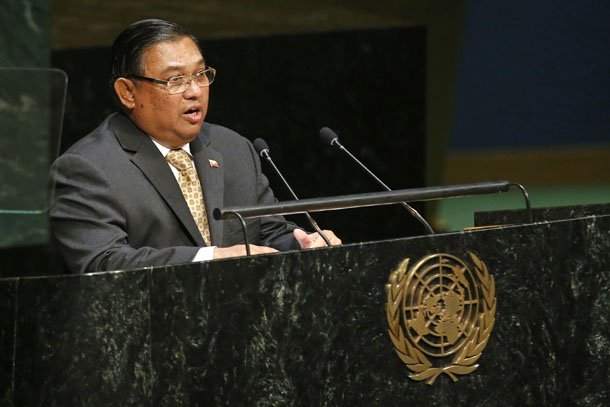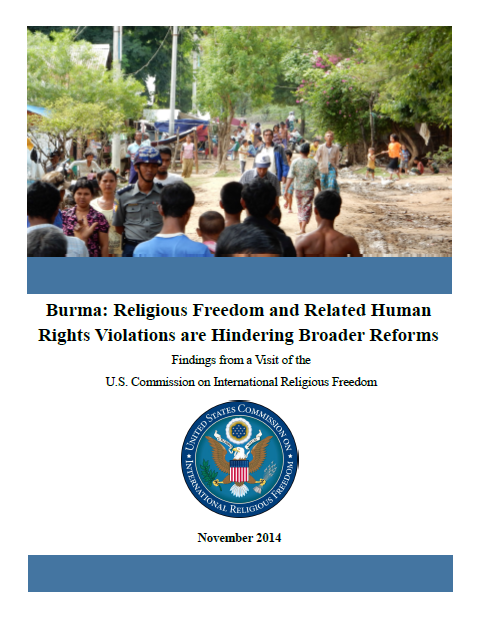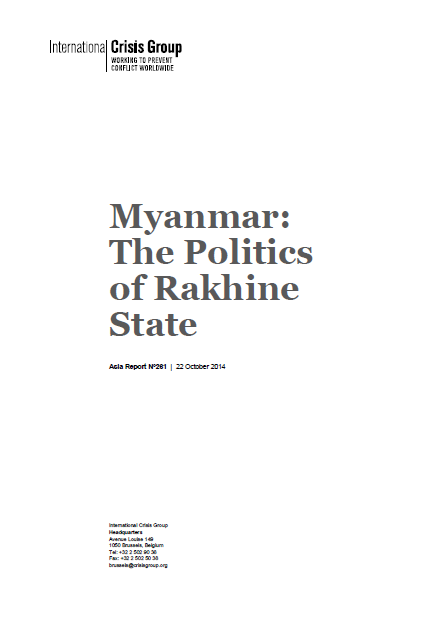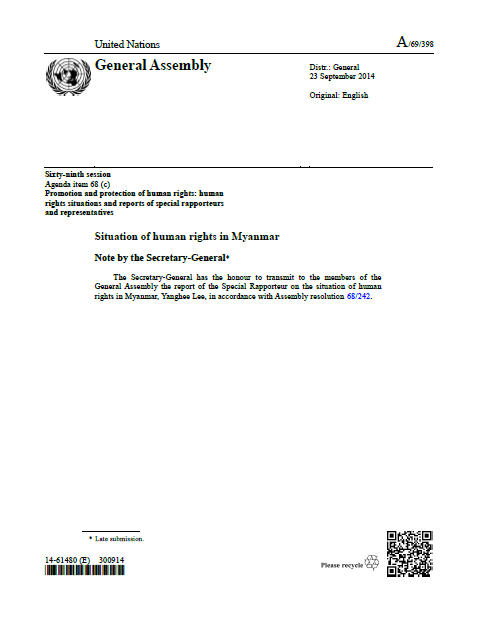Posts Tagged ‘Muslims’ (100 found)
Obama’s Chance to Make Burma a Genuine Foreign Policy Success
As President Obama prepares to make his second visit to Burma, it is worth looking back at the promises made to him by Burma’s President Thein Sein on his last visit in November 2012 and to assess the worth of these promises. Burma, after all, is largely seen as a foreign policy success by the current administration amid the mess of Ukraine, Libya and the threat of ISIS […]
• •Burma: Religious Freedom and Related Human Rights Violations are Hindering Broader Reforms
The dramatic political developments in Burma in recent years are of historical and geopolitical significance. Bur-ma has progressed much further than most might have imagined possible only a few short years ago. Despite these achievements, Burma still has a long journey along the road to democracy and respect for human rights. Serious violations of religious freedom and human rights continue, accompanied by disturbing evidence of prejudice and intolerance, trends that will inevitably and dramatically impact the prospects for a brighter future. In short, the political reform process in Burma is at great risk of deteriorating if religious freedom and the right to equal treatment under the law are not honored and protected. […]
• • •Burma: USCIRF Issues Report on Religious Freedom and Related Human Rights Violations
WASHINGTON, DC – On the eve of President Obama’s November 12-14 trip to Burma, the U.S. Commission on International Religious Freedom (USCIRF) today released a new report, “Burma: Religious Freedom and Related Human Rights Violations are Hindering Broader Reforms.” The report and its recommendations reflect a USCIRF Commissioner-level visit to Burma in August 2014 by Commissioners M. Zuhdi Jasser and Eric P. Schwartz and two USCIRF staff. […]
• • •Myanmar: The Politics of Rakhine State
The situation in Rakhine State contains a toxic mixture of historical centre-periphery tensions, serious intercommunal and inter-religious conflict with minority Muslim communities, and extreme poverty and under-development. This led to major violence in 2012 and further sporadic outbreaks since then. The political temperature is high, and likely to increase as Myanmar moves closer to national elections at the end of 2015. It represents a significant threat to the overall success of the transition, and has severely damaged the reputation of the government when it most needs international support and investment. Any policy approach must start from the recognition that there will be no easy fixes or quick solutions. The problems faced by Rakhine State are rooted in decades of armed violence, authoritarian rule and state-society conflict. This crisis has affected the whole of the state and all communities within it. It requires a sustained and multi-pronged response, as well as critical humanitarian and protection interventions in the interim […]
• • •Media Release – Myanmar: The Politics of Rakhine State
The highly volatile situation in Myanmar’s Rakhine State adds dangerously to the country’s political and religious tensions. Long-term, incremental solutions are critical for the future of Rakhine State and the country as a whole […]
• • •Dispatches: A Scathing Verdict on Burma’s Stalled Reforms
A remarkable set of meetings took place this week in Rangoon, with more than 650 representatives from Burmese civil society groups gathering to discuss the status of the country’s reform process […]
• • •69th Session of the UN General Assembly – Situation of human rights in Myanmar: Report of the Special Rapporteur on the situation of human rights in Myanmar
I. The mandate of the Special Rapporteur on the situation of human rights in Myanmar was established pursuant to Commission on Human Rights resolution 1992/58 and recently extended by Human Rights Council resolution 25/26. The present report is submitted pursuant to Council resolution 25/26 and General Assembly resolution 68/242.
II. Background
2. Following the completion of the term of the previous mandate holder, the current mandate holder took up her functions only in June 2014, which resulted in a shorter period than usual to conduct a country visit and review the information gathered. The present report therefore sets out the Special Rapporteur’s preliminary observations, to be supplemented by her oral statement to the General Assembly […]
• • •World Bank Should Promote Human Rights in Burma, NGOs Say
RANGOON — Human Rights Watch (HRW) and Burmese civil society organizations have urged the World Bank Group to put human rights at the center of its new Burma country strategy.
They said the bank should encourage an improvement in respect for rights within the Burmese government, while also ensuring that its development projects do not exacerbate ethnic conflict and the land rights’ situation […]
• •“Winds of Change” Blow a Gale of Human Rights Abuses
 Burma’s Foreign Minister, Wunna Maung Lwin, gave a glowing report on the progress towards democracy and respect for human rights in Burma at the UN General Assembly (UNGA) yet given the deteriorating human rights situation on the ground, it is difficult not to view his words as a North Korean-esque sting in the tail.
Burma’s Foreign Minister, Wunna Maung Lwin, gave a glowing report on the progress towards democracy and respect for human rights in Burma at the UN General Assembly (UNGA) yet given the deteriorating human rights situation on the ground, it is difficult not to view his words as a North Korean-esque sting in the tail.
Wunna Maung Lwin specifically requested that Burma be taken off the agenda of the Human Rights Council as well as the Third Committee of the UNGA, citing that “all major concerns related to human rights have been addressed to a larger extent in the new Myanmar.” Yet on closer inspection, this statement is preposterous, with the realities on the ground providing a striking contrast to these words.
Remarking on the peace process, the government is apparently “serious in its commitment” to making this work. The problem is that the government and the Burma Army say and do different things. As the government is making promises to ethnic armed groups, the Burma Army is still launching offensives in Kachin State and northern Shan State. Even with groups that have a ceasefire, the Burma Army continues its aggression, as seen in Kyeithi Township, Shan State over the weekend where it attacked Shan State Army – North positions yet again. Around 300 villagers have been forced to flee in this township alone in recent months due to attacks. This is emblematic of the current state of the peace process, where too much attention has been placed on the signing of a nationwide ceasefire agreement. Yet as recent clashes indicate, a ceasefire simply isn’t enough to rein in the Burma Army, and this state of affairs remains volatile, as the recent briefing paper produced by Burma Partnership explains […]
• • •Burma: Government Plan Would Segregate Rohingya
(New York) – A draft government plan would entrench discriminatory policies that deprive Rohingya Muslims in Burma of citizenship and lead to the forced resettlement of over 130,000 displaced Rohingya into closed camps, Human Rights Watch said today. Burma’s international donors, the United Nations, and other influential actors should press the government to substantively revise or rescind its “Rakhine State Action Plan.” […]
• • •











 All posts
All posts